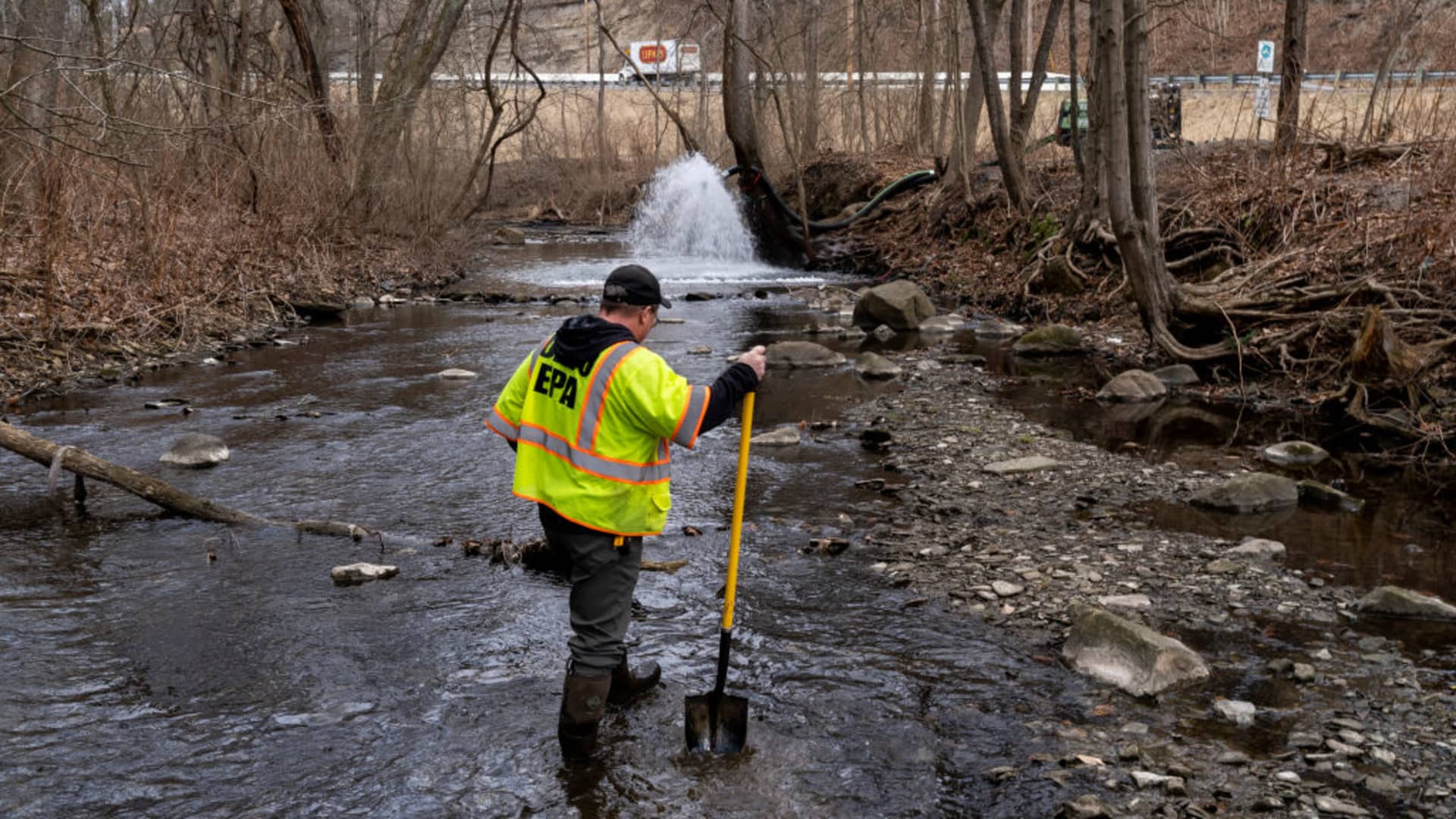Norfolk Southern CEO Alan Shaw told CNBC he thinks it’s safe for families to return to East Palestine, Ohio, nearly three weeks after toxic chemicals were released following a train derailment earlier this month.
Asked by CNBC’s Morgan Brennan whether he’d bring his children to the town, Shaw said: “Yes, yes, I’ve come back multiple times. I’m drinking the water here. I’ve interacted with the families here.”
The company will also continue to help residents of the town, as well, Shaw said.
On Feb. 3, a Norfolk Southern freight train carrying hazardous chemicals derailed, igniting a dayslong fire. The environmental magnitude of the derailment could remain unknown for years and more testing may be required. Officials have said air levels are safe and the town’s water is free of harmful levels of contaminants, although residents have expressed skepticism about those assurances.
“Our focus right now is on environmental remediation, cleaning up this site, continual air monitoring, water monitoring, financial assistance to the residents of this community, and investing in this community so that the community in East Palestine can thrive,” Shaw said in an interview that aired Tuesday.
Earlier Tuesday, the federal Environmental Protection Agency ordered the company to handle and pay for all cleanup efforts. It will require Norfolk Southern to clean any contaminated soil and water resources, reimburse the EPA for cleaning services and participate in public meetings at the EPA’s request.
A company spokesperson told CNBC Norfolk Southern has been in communication with the agency and in compliance with its requests since the incident.
Three days after the derailment, the company’s independent consultant and the Ohio EPA recommended unified command for a controlled release to burn off toxic chemicals, including known carcinogens.
“The fact that we knew at that time that the pressure relief valves on the cars had failed, temperatures were rising, caused our independent expert to become very concerned about the potential for an uncontrolled explosion that would shoot harmful gas and shrapnel into a populated community,” Shaw said.
The air monitoring picked up no traces of toxic chemicals, officials said, although Shaw acknowledges “how it could scare folks.”
Ohio opened a new health clinic Tuesday to address increasing reports of headaches, nausea and rashes in East Palestine. Worried residents also reported dead fish and chickens as authorities said it’s safe to return. As early as this week, medical teams from the U.S. Centers for Diseases Control and Prevention and the US Department of Health are expected to arrive in the community.
A ‘traumatic experience’
Shaw said air monitoring was installed within an hour of the derailment, and water monitoring was in place several hours afterward. He said all tests for air and water have come back clean, but he said the community can get additional air and water testing in their homes.
“If folks are experiencing symptoms with which they’re not accustomed, I would strongly encourage them to go see a trusted medical professional,” Shaw said, acknowledging it has been a “traumatic experience.”
Tests have revealed no signs of carcinogens including vinyl chloride in the environment, officials said. Still, there remains the possibility that the full impact won’t surface until years from now. Shaw said some researchers have said this is not a concern and testing will continue into the future.
Shaw said the company so far removed about 450 cubic yards of contaminated soil and secured about 1.1 million gallons of contaminated water. He said the company will continue to “do the right thing for this community” and see the recovery effort all the way through. He did not lay out a time frame.
Shaw said it’s safe for families to return to the community as environmental remediation with the Ohio EPA is underway. He said Norfolk Southern has reimbursed or committed a “downpayment” of $6.5 million to East Palestine and will continue financial assistance to residents.
The company previously offered residents $1,000 “inconvenience” checks, but a Cleveland attorney cautioned residents these checks would get residents to waive future claims against the company. Shaw in the interview denied the lawyer’s claims after the company made public statements that doing testing absolved Norfolk Southern of no liability.
“I know they’re hurt. I know they’re scared. I know they’re confused. They’re looking for information and who to trust,” Shaw said.
Shaw said Norfolk Southern is fully cooperating with the NTSB and the FRA to come up with the root cause of the derailment. He avoided talking about security footage showing a wheel shooting off sparks about 20 miles before the derailment.
“We’re going to be here tomorrow. We’re going to be here a year from now. We’re going to here five years from now. We’re going to do what’s right for this community and help this community get back on its feet and help this community thrive,” Shaw said.
Responding to criticism
Transportation Secretary Pete Buttigieg sent a letter Sunday to Norfolk Southern, warning that the company must “demonstrate unequivocal support for the people” of East Palestine.
Buttigieg wrote that Norfolk Southern and other rail companies have “spent millions of dollars in the courts and lobbying members of Congress to oppose common-sense safety regulations, stopping some entirely and reducing the scope of others.”
Some companies have adopted precision-scheduled railroading, which includes running longer trains, and cutting costs and headcounts to create a more effective network — and potentially profit.
In response, Shaw said Norfolk Southern invests over $1 billion a year in “science-based soutions,” including maintaining tracks, equipment and technology.
Sen. Sherrod Brown, D-Ohio, said in a CNN interview that railroads “are simply not investing the way they should in car safety and the rail lines themselves,” resulting in layoffs and stock buybacks.
“It’s pretty clear that our safety culture and our investments in safety didn’t prevent this accident,” Shaw said in response. “We need to take a look at this and see what we can do differently and what we can do better.”
